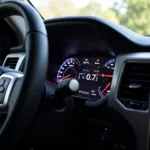For Volkswagen owners, a reliable OBD2 tool is essential for troubleshooting those pesky check engine lights and understanding your car’s health. Whether you’re a seasoned mechanic or a DIY enthusiast, having the right Volkswagen OBD2 tool can save you time, money, and frustration.
This comprehensive guide dives deep into the world of Volkswagen OBD2 tools, exploring everything from basic code readers to advanced diagnostic scanners. We’ll help you choose the best tool for your needs and budget, empowering you to take control of your Volkswagen’s maintenance.
Understanding OBD2 and Your Volkswagen
Before we delve into the tools, let’s clarify what OBD2 is and its significance for Volkswagen owners. OBD2, short for On-Board Diagnostics, is a standardized system that allows external devices to communicate with your car’s computer. This system grants access to a wealth of information about your Volkswagen’s engine, transmission, emissions, and other crucial systems.
Volkswagen has been incorporating OBD2 systems in its vehicles since the mid-1990s. This means if you own a Volkswagen manufactured after 1996, you can use an OBD2 tool to:
- Retrieve Diagnostic Trouble Codes (DTCs): When your check engine light illuminates, an OBD2 tool can read the specific codes stored in your car’s computer, pinpointing the potential issue.
- Clear DTCs: After addressing a problem, you can use an OBD2 tool to clear the codes and turn off the check engine light.
- Access Live Data Stream: Monitor real-time sensor data such as engine RPM, coolant temperature, oxygen sensor readings, and more. This feature is invaluable for diagnosing intermittent problems or monitoring your engine’s performance.
Types of Volkswagen OBD2 Tools
The market offers a wide range of Volkswagen OBD2 tools, each catering to different needs and budgets. Let’s explore the most common types:
1. Basic OBD2 Code Readers
These are the most affordable and straightforward tools. They can read and clear basic DTCs, providing a starting point for diagnosing your Volkswagen’s issues. However, they typically don’t offer live data streaming or advanced functions.
Ideal for: Car owners who want a simple tool to check and clear engine codes.
2. Advanced OBD2 Scanners
These tools offer a comprehensive suite of features beyond basic code reading and clearing. They provide access to live data streams, manufacturer-specific codes, and advanced diagnostic functions. Some scanners even offer bi-directional control, allowing you to perform tests on specific components.
Ideal for: DIY enthusiasts and mechanics who require in-depth diagnostic capabilities.
3. Volkswagen-Specific Scanners
These tools are tailor-made for Volkswagen vehicles, offering the most comprehensive diagnostic capabilities. They provide access to all Volkswagen-specific codes, live data parameters, and coding functions. These scanners often come with software that provides detailed information about each code and potential fixes.
Ideal for: Professional mechanics and experienced Volkswagen enthusiasts who demand the highest level of diagnostic accuracy and functionality.
Choosing the Right Volkswagen OBD2 Tool
With so many options available, selecting the right Volkswagen OBD2 tool can seem daunting. Consider these factors to make an informed decision:
- Your Budget: Basic code readers are the most affordable, while advanced and Volkswagen-specific scanners come at a premium.
- Your Technical Expertise: If you’re a beginner, a basic code reader might suffice. Advanced users might benefit from the comprehensive features of a high-end scanner.
- Your Volkswagen Model: Some scanners are designed to work with specific Volkswagen models or model years. Ensure compatibility before purchasing.
Common Volkswagen OBD2 Codes
While an OBD2 tool can read the codes, understanding their meaning is crucial. Here are some common Volkswagen OBD2 codes and their possible interpretations:
- P0420: Catalyst System Efficiency Below Threshold (Bank 1) This code often indicates a failing catalytic converter, a critical component of your Volkswagen’s emissions system.
- P0171: System Too Lean (Bank 1) This code suggests that your engine is running lean, meaning there’s too much air compared to fuel. Possible causes include a vacuum leak, a faulty mass airflow sensor (MAF), or a problem with the fuel injectors.
- P0300: Random/Multiple Cylinder Misfire Detected This code indicates that one or more cylinders in your engine are misfiring, potentially leading to poor performance, rough idling, and reduced fuel economy.
Beyond Diagnostics: Unlocking Your Volkswagen’s Potential
While diagnosing problems is crucial, Volkswagen OBD2 tools can do much more. Advanced scanners, particularly Volkswagen-specific ones, can unlock hidden features, customize settings, and even perform coding functions. This can include anything from adjusting throttle response to enabling convenience features that were previously deactivated.
Conclusion
A Volkswagen OBD2 tool is an indispensable asset for any Volkswagen owner, empowering you to understand, diagnose, and even enhance your vehicle. By understanding the different types of tools available, their capabilities, and your specific needs, you can make an informed decision and unlock a new level of control over your Volkswagen’s maintenance and performance.
